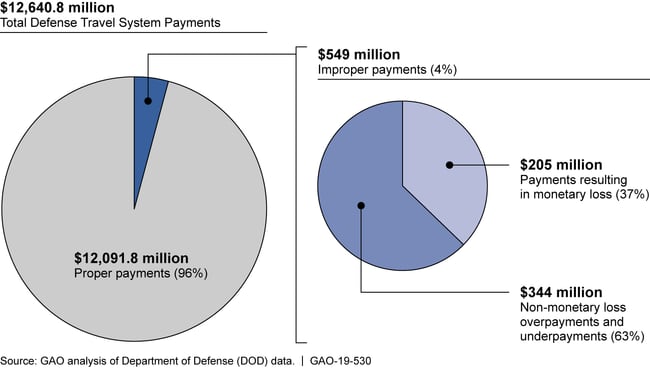The Department of Defense processed nearly $1 billion in improper travel payments to service members and civilian employees over a three year span, a Government Accountability Office report found.
Improper travel payments, classified as amounts that should have either not been distributed at all or were dished out in an incorrect sum, have long been a thorn in the government’s side, with service members either often receiving too much money, or no money at all, for international travel expenditures.
Using the Defense Travel System to process travel payments from fiscal years 2016 to 2018, DoD disbursed a total of $18.3 billion, reimbursement authorizations that were made after travelers submit vouchers documenting expenses, according to the report.
Of that, GAO found $965.5 million- or more than 5 percent - was discovered to be improperly distributed.
“Not all improper travel payments — such as legitimate payments that initially lacked supporting documentation ― represented a monetary loss to the government,” the report said.
But a significant sum was, in fact, lost.
From FY2017 to FY2018, for example, DoD incurred $549 million in improper payments. Of that sum, $205 million was counted as a complete loss.

These concerning gaffes were made despite a DoD plan established in 2016 to remedy errors exactly like them.
The Defense Travel Management Office, the Defense Finance and Accounting Office, and the Office of the Under Secretary of Defense all take steps to ensure Defense Travel System regulations are met.
“On a monthly basis, DFAS statistically samples paid travel vouchers,” the report said. “DFAS officials then conduct a review of the sampled post-payment vouchers to identify erroneous travel vouchers and the types of errors that were made.”
One such review in FY2018 revealed an improper payment rate of nearly 5 percent of that year’s almost $8 billion in travel payments, a rate of error that has remained consistent over the reviewed three-year span despite the aforementioned efforts to curb payment gaffes.
In 2016, over 7 percent of payments were considered improper.
Most of the payments made — 36 percent — were related to training.
The next highest sum distributed was categorized as routine TDY, or travel assignments to locations “other than the employee’s permanent duty station,” the report said.
The continuation of improper distribution suggests that DoD’s remediation plan and committee it installed to enforce it “may not manage risk sufficiently,” according to the GAO report.
Additionally, elements of the Defense Department’s remediation plan were cited as incorrectly identifying primary causes of erroneous travel pay, and even when a singular cause was correctly identified, no follow up occurred to ensure the component at fault was properly adhering to the plan put in place.
“Many actions remain incomplete, and communication of requirements was lacking," the report claimed. “DoD has implemented mechanisms to identify errors leading to improper travel payments, but these efforts do not clearly identify root causes of these errors or the cost-effectiveness of addressing them.”
The GAO report recommended the above flaws be addressed — remedies to the DoD’s remediation plan — before travel pay can be accurately tracked.
Pentagon officials largely agreed with the GAO recommendations.
J.D. Simkins is the executive editor of Military Times and Defense News, and a Marine Corps veteran of the Iraq War.




